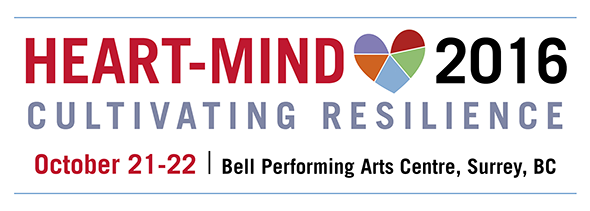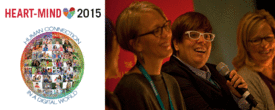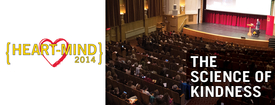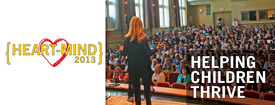Workshops

Heart-Mind 2016 registrants can choose either a Big Conversation/Small Group session with one of the conference presenters, or one of the Professional Development Workshops listed below. Once you are registered for the conference, the DLC team will contact you by email about making your break-out selection.
We all have worries and fears that at times get in the way of our doing our best, or managing stressful situations, or that limit our ability to be flexible and adaptable. The FRIENDS For Life program is used in schools and reinforced in homes throughout BC and in many other countries. It has been shown to help children and adolescents manage anxiety, develop coping strategies to solve difficult social and personal situations and become more connected to their peers and to caring adults in their lives. In this session, participants will learn the theory upon which the program is based, it’s alignment with the new curriculum, have the opportunity to practice many of the FRIENDS skills and watch the program in action with children and youth, teachers and parents.
Audience – Parents, teachers, and others who work with and care about promoting resilience children and youth will benefit from this workshop.
Heart-Mind well-being is the term used by the Dalai Lama Center (DLC) to refer to creating a balance between educating the mind and educating the heart. While there is a great focus in our society on academic achievement, research has demonstrated the positive impacts of social and emotional learning and, in fact, that heart and mind learning are interconnected. We can successfully create conditions in families, schools and communities that build capacity in children to recognized their emotions, to understand and empathize with others, and to behave in pro-social ways – all powerful ingredients in sustaining individual and community resilience and well-being. This workshop will provide an overview of the Heart-Mind well-being framework and its application in our work with children, families and community. It will also introduce the online toolkit Heart-Mind Online.
Audience – Anyone who teaches and cares for children and youth.
Resilient people have a greater capacity for kindness and can create stronger, more meaningful relationships. Resilience can be cultivated through our behaviors and attitudes. In this workshop participants will learn how to apply Random Acts of Kindness resources to school and home settings to connect children with their inner resilience and evaluate results.
Audience – Educators, counselors, parents and caregivers.
WellAhead is a philanthropic initiative of the J.W. McConnell Family Foundation that aims to improve child and youth mental health through sustained integration of social and emotional well-being in school communities. In this session, we'll share learnings from our first year, when the initiative partnered with 6 school districts in British Columbia, Canada, to co-design, prototype (develop/test) and scale simple approaches (i.e. ‘everyday practices’) to advance student social and emotional well-being in the school setting. These practices have a significant impact on cultivating resilience in youth – and in adults, as well. Participants will learn about tools, facilitation guides, and approaches that you might use to generate well-being approaches, prototype them, and learn systematically throughout the process.
Audience – Educators, principals, superintendents/associate superintendents, and champions for youth well-being.
Workshop participants use their understanding of compassion to explore evidence of the Residential School experience through inquiry. The inquiry project was sparked by our shared participation in the decommission ceremony of St. Michael’s Residential School in Alert Bay, BC on February 18, 2015. While viewing video clips, photographs, and other artefacts, participants are invited to ask questions, make connections, infer, think critically and communicate what they notice, think and wonder. The inquiry leads to exploring the questions “What is reconciliation?” and “How are reconciliation and compassion linked?” Through dialogue and further exploration, we invite participants to help us define reconciliation; and to consider, “How might this learning contribute to a more compassionate, inclusive and peaceful society?”
Audience – Educators, Parents, School Counselors, Community Support Workers and others.
To quote Dr. Bruce Perry “resiliency = stress + support”. His research, among many others, underscores that while this formula may sound simplistic, fostering the resiliency of young people is anything but! That said, never before have we known so much about what’s necessary and possible. This workshop will highlight a suite of practical, evidence-backed, strategies geared to helping young people survive and thrive in today’s world – a world full of stress, drugs and other promises and panaceas!
Audience – Teachers, counselors, parents, health professionals.
A sense of security in relationships is a profound source of resilience. This is especially true in childhood and adolescence. Adolescence is inherently a challenging developmental period that involves a wide range of neuro-developmental, social and emotional changes. Although teens push for autonomy, research clearly shows that they benefit tremendously from a sense of connection and security with those who care for them, including parents, teachers and other caregivers. Attachment security is not set in stone by early childhood; indeed teens and even adults can build security through healthy relationships. In this 90-minute session, Dr. Moretti and Karla Braber will discuss the importance of attachment during adolescence, challenges, and describe the foundations of the Connect program. Their work focuses on developing a brief, easily implemented and structured program that helps parents and other caregivers build security with teens. National and international evidence and feedback from families will be presented, and participants will experience session exercises.
Audience – Educators, clinicians/mental health practitioners, parents/caregivers.
Increasingly, school-based primary prevention efforts are incorporating mindfulness-based practices to foster resiliency, social emotional skills, and well-being. In this session, participants will learn about how mindfulness practice can promote resilience in children by reducing stress and anxiety, while also fostering self-awareness, focus, and compassion. The session will illuminate the connections between mindfulness, Social Emotional Learning (SEL), and areas of the new B.C. Curriculum. Concepts will be expanded to explore practical tools for educators that help weave mindfulness into daily classroom life. An overview of currently available mindfulness-based resources including a new digital resource developed by the Committee for Children (http://www.cfchildren.org) will also be presented.
Audience – Early Childhood and K-7 Educators.
Do you know learners who find it challenging to recover from strong emotions? Maybe you can think of a student who gets so excited they become distracted from learning? Or a student who becomes so anxious they aren't able to focus on the task at hand? Emotional resilience allows individuals to handle stress, persevere in the face of challenge, and recover from emotionally hijacking situations- skills that are essential for allowing children and youth to thrive in the classroom and beyond. This interactive workshop is designed to explore ways in which we can support the development of emotional resilience in children and youth. Come and learn how to provide opportunities for learners to learn and apply the emotional literacy skills (perceiving, naming and understanding emotions) that are essential for emotional resilience.
Audience – Educators (teachers, administrators, EA’s, counselors, etc.), Parents, Service Providers and Community members.
Lori and Chantelle will facilitate a multi-media presentation that will look at the phenomenon of hyper-sexualization of girls and hyper-masculinization of boys. Participants will discuss why it is a problem, and explore strategies for cultivating resiliency in children.
Audience – Parents, youth educators, and all those concerned with the well-being of children and youth.
Yaffa Maritz – Founder and Director of “Community of Mindful Parenting” and “Listening Mothers”; Jennifer Given-Helms – Counselor, special education teacher and a "Listening Mothers" faciliator
Creativity makes freedom possible. It doesn’t exclude or judge the experiences: it allows you to express your uniqueness without looking for the outcome. In this workshop, participants are invited to discover different ways of experiencing the present moment. Through conscious breathing, body movement, and creative expression, they will learn a non-verbal tool to perceive reality. They will be able to turn off the automatic-pilot of daily life by inner observation and body awareness.
Audience – This workshop is intended to anyone interested on conscious living and exploring new ways of acting in life.



